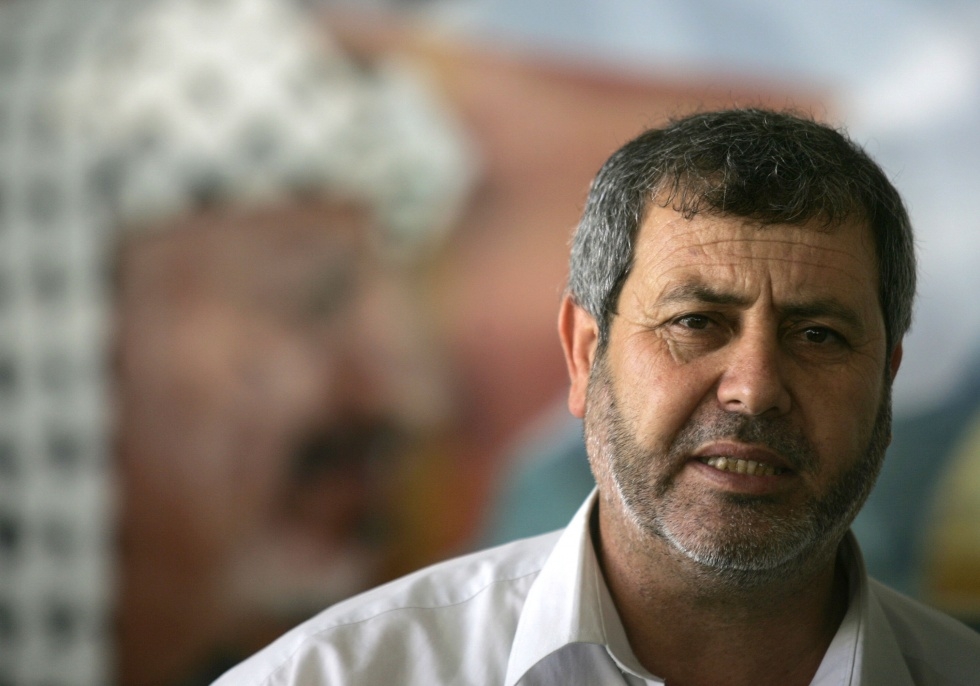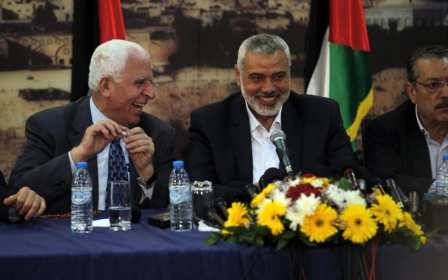Islamic Jihad wants unity deal hastened, fears US-Israel meddling

As a non-member of the Palestinian Liberation Organisation (PLO), Palestinian resistance movement Islamic Jihad was not privy to the negotiations between the PLO and Hamas that resulted in Wednesday’s agreement to end the seven-year Fatah-Hamas split.
But as one of Palestine’s most important factions, they are crucial to the success of any deal and say they have considerable interest in participating and helping to build the future of the country.
Khaled Al-Batsh, spokesperson for Islamic Jihad in Gaza, told Middle East Eye that the group welcomes the mechanism to implement the agreements made in Cairo and Doha in 2011 and 2012 respectively.
“What happened yesterday is the end of seven years of division, and Islamic Jihad welcomes it,” Batsh said.
“At the same time, we criticise the proposed five-week timetable to form the government. During these five weeks we may face attempts to interrupt the process from several areas - from Israel and the United States, and internally from people who feel they will not benefit from unity.
New MEE newsletter: Jerusalem Dispatch
Sign up to get the latest insights and analysis on Israel-Palestine, alongside Turkey Unpacked and other MEE newsletters
“That is why we call for speeding up the formation of the government.”
Islamic Jihad will not participate in the selection of the interim prime minister as agreed, as that will be left to discussions between the PLO and Hamas.
The group says it is stepping back “firstly, [due to] individual mentality,” and secondly because, “Hamas and Fatah started the fight so it was up to them to sort it out - and they did.”
Islamic Jihad’s acceptance of the reconciliation process is paramount. The group is widely linked to sporadic missile attacks that strike Israel from Gaza and has been growing in influence. In March, when Egypt strove to broker the latest truce with Israel it called Islamic Jihad, not Hamas while in February long-time Hamas backer Iran made moves to strengthen ties with Islamic Jihad.
However, after the reconciliation agreement last week, Israel cancelled all negotiations with the Palestinians and on Thursday launched air strikes on the Strip. According to regional media reports, two Islamic Jihad members were the target of the strike. While they escaped unscathed, 12 by-standers were injured in the attack.
The group’s significance is made immediately clear by this swift response, and there is good reason to fear that Islamic Jihad will continue to be a main focus of Israeli wrath.
“That is why we are warning that the agreement should be immediately implemented, because Israel will try to destroy it, and they will also put pressure on Abu Mazen [Palestinian President Mahmoud Abbas],” responded Batsh.
The road from here?
Islamic Jihad insists that its allegiance to the reconciliation will endure even if Abbas is put under enormous pressure, or possibly even forced out as some analysts believe.
“The unity agreement should continue under all circumstances, whatever happens,” Batsh said. “We should not fail in this, unity is a national and a moral duty for us all. Getting an agreement has succeeded, but we warn again, we need to implement it immediately.”
Elections look to be the most problematic aspect of the agreement, with Israel widely expected to impede the process.
Batsh was quick to point out that there are in fact two kinds of elections. The Palestinian presidential and legislative council elections for the PA, which will only concern residents of the Occupied Palestinian Territories, and the Palestine National Council (PNC) elections, which will take place both inside and out of Palestine.
The PA was created during the Oslo agreements and is the interim self-governing body in the occupied territories. The PNC meanwhile is a 669 member legislative body founded in 1964 that is responsible for electing the executive committee of the Palestinian Liberation Organisation (PLO), which is widely recognised as the sole legitimate representative of the Palestinian people.
In terms of the presidential and parliamentary votes for the PA, Batsh believes that these are an international project and an international demand and will be protected accordingly. He argues that the Middle East Quartet - comprised of the UN, US, EU and Russia - alongside other international players will strive to prop up the PA and will therefore put a lot of pressure on Israel to not interfere with Palestine’s national electoral process.
The PNC elections, however, might face significant obstacles despite perhaps their potential greater important for future of the agreement, and the future of Palestine.
“The National Council elections are connected to the PLO, and will be implemented everywhere,” said Batsh. “In the places where there will be difficulties holding elections, for example in Syria, they will nominate their allocation of representatives to facilitate the election process.”
Quickly rebuilding the PLO is even more important than the reconciliation government, Batsh argues.
“The involvement of all of the factions and groups is a guarantee that there will be no later division. From the point of view of the leadership, it is a guarantee to work co-operatively together.”
Many are now wondering what the reaction of former PA strongman Mohammed Dahlan will be. As a former Palestinian Authority minister, a former National Security advisor and a former head of Gaza’s PA Preventative Security Service, some analysts have tipped Dahlan as a possible future PA leader, despite his banishment by both Fatah and Hamas.
“Dahlan is Palestinian, he speaks of unity so he can be expected to be working for the agreement, as it is for all Palestinians. He has not said anything against the agreement,” said Batsh.
International community shut out
While the international community plays a vital role in Palestine, brokering talks, providing economic assistance and monitoring or restricting borders, Islamic Jihad does not seem to be overly concerned about its response to the reconciliation. The reactions of the Arab world in particular are being regarded as peripheral.
“The Arab countries’ leaders don’t have time for Palestine, they have their own internal problems,” Batsh said.
“When Abu Mazen met with their foreign ministers they told him that if he went back to negotiations with Israel they would give him an ‘Arab umbrella.’ The United States’ request to Abu Mazen to extend the negotiations will make a lot of Arab countries comfortable.”
Egypt, however, is another case entirely.
The Rafah Crossing between Egypt and Gaza is a vital lifeline to the Strip, although Egyptian authorities - to their embarrassment - have kept the crossing closed and have cracked down on a network of tunnels that have funnelled much-needed supplies into Gaza since Israel instigated a blockade in 2007.
“We hope when the reconciliation government is formed that Rafah will open again - this is what the Egyptians promised,” Batsh said.
“We respect the choices of the Egyptian people, and we want Egypt to be safe and its army to be in peace and not to be distracted by unnecessary issues.”
The Palestinian issue has long been a cause dear to the hearts of all Egyptians, calls for greater support are widespread and Egypt’s perceived assistance for the blockade was a widely touted grievance during Egypt’s 2011 revolution, and Batsh thinks that elections can be won and lost on it."
“We hope that [Egypt’s former field marshal and presidential hopeful Abdel Fattah] Sisi will stand with our people and with our reconciliation, and open the Rafah Crossing,” Batsh said. “We don’t think their relationship with Israel will stand in the way of supporting Palestine.”
Middle East Eye delivers independent and unrivalled coverage and analysis of the Middle East, North Africa and beyond. To learn more about republishing this content and the associated fees, please fill out this form. More about MEE can be found here.



